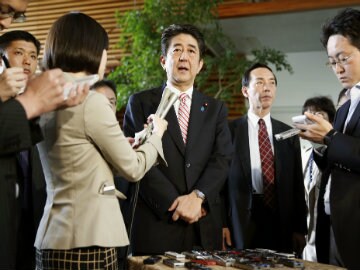
Japanese Prime Minister Shinzo Abe, center, speaks to the media before his departure for Singapore at the prime minister's official residence in Tokyo Friday, May 30, 2014.
Tokyo, Japan:
Japanese Prime Minister Shinzo Abe will outline his vision for Japan's defense contribution to regional security to promote peace and prosperity amid tension over China's growing assertiveness and maritime activity.
Abe will deliver a keynote speech Friday at the Asia Security Summit in Singapore, known as the Shangri-La Dialogue, becoming a first Japanese leader to do so at the gathering. Security is a sensitive topic for Japan, once an aggressor in Asia, to discuss in the region.
Abe said he will make clear China's one-sided maritime and military activities are unacceptable. He will also try to outline his security vision proposing Japan's contribution for regional and global peace.
"I will send a strong message that we will never condone attempts to change status quo by force," he told reporters before departing for Singapore. "I also plan to explain in details what Japan can do to contribute to the Asia-Pacific region and the world" under Japan's new diplomatic and security strategy.
China's moves to assert its territorial claims in the South China Sea are giving impetus to Abe's hopes to play a bigger role in regional security.
In a tangible sign of Abe's effort to deepen ties with Southeast Asia, Japan is exploring whether to supply patrol boats for Vietnam by using Official Development Aid. Japan has agreed to provide 10 Japanese-made boats to the Philippines.
Abe's government is trying to ease constitutional restraints on Japan's military, which can be used only in its own self-defense. He says Japan's pacifist constitution restricts its global contribution and needs to be revised - but for now by re-interpreting the war-renouncing Article 9 more broadly to allow Japan's military to defend foreign troops.
Abe will deliver a keynote speech Friday at the Asia Security Summit in Singapore, known as the Shangri-La Dialogue, becoming a first Japanese leader to do so at the gathering. Security is a sensitive topic for Japan, once an aggressor in Asia, to discuss in the region.
Abe said he will make clear China's one-sided maritime and military activities are unacceptable. He will also try to outline his security vision proposing Japan's contribution for regional and global peace.
"I will send a strong message that we will never condone attempts to change status quo by force," he told reporters before departing for Singapore. "I also plan to explain in details what Japan can do to contribute to the Asia-Pacific region and the world" under Japan's new diplomatic and security strategy.
China's moves to assert its territorial claims in the South China Sea are giving impetus to Abe's hopes to play a bigger role in regional security.
In a tangible sign of Abe's effort to deepen ties with Southeast Asia, Japan is exploring whether to supply patrol boats for Vietnam by using Official Development Aid. Japan has agreed to provide 10 Japanese-made boats to the Philippines.
Abe's government is trying to ease constitutional restraints on Japan's military, which can be used only in its own self-defense. He says Japan's pacifist constitution restricts its global contribution and needs to be revised - but for now by re-interpreting the war-renouncing Article 9 more broadly to allow Japan's military to defend foreign troops.
Track Latest News Live on NDTV.com and get news updates from India and around the world

